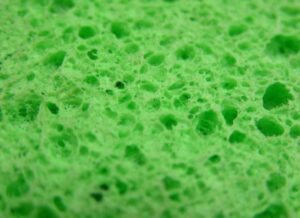What’s Your Sponge Made Out Of?

Hands immersed in sudsy water, you’re busy scouring your pots and pans to a squeaky clean using your, of course, natural dish soap. While scrubbing, you’re feeling pretty good about your eco-self for ridding your home of toxic household cleaners like conventional dish soaps (and you should!), but wait a sec. Are you using a sponge? Because if so, that sponge could be undoing your good green cleaning efforts.
Many everyday sponges are derived from polyurethane, a petroleum-based ingredient, in addition to other manmade materials. Essentially, conventional sponges are made from oil-based plastic. Not very green, huh?
It gets (gasp!) worse. Sponges promising antibacterial or odor-removing benefits are loaded with toxic chemicals including triclosan, an antimicrobial agent (and pesticide) that has been linked to cancer, developmental toxicity and skin irritation. This chemical has also made its way into 60 percent of American waterways, wreaking havoc on marine life. How do you feel about tossing that sponge in the trash now?
Then there’s the waste factor. You germophobes probably already know that the porous quality of sponges, which makes them great for creating sudsy, scrubbing action, also allows them to become hot spots for bacteria-freeloaders looking for a moist place to grow. The solution? Change those bad boys out—and often. But from a green standpoint that amounts to a lot of unnecessary garbage heading to the landfill.
So what’s an eco-conscious clean freak to do? Give these green sponge alternatives a go:
Better scrubber options…
Cellulose sponges: Made from wood pulp, these superabsorbent sponges, while a bit more pricy, are completely biodegradable. Make sure to buy 100 percent cellulose sponges, otherwise they will contain polyester filling.
Rags: From an eco-stance, rags are the best green scrubbing option. Good ol’ rags can give just as much cleaning power as sponges minus the waste. In serious eco-style, you could create your own rags from old T-shirts, towels or other scrap cloth you have on hand. But even if you have to purchase rags, they’ll last a whole heck of a lot longer than a plastic sponge.
Handmade sponges: A quick search on Etsy will reveal a list of handmade sponges. Try searching “kitchen sponge” or “eco-friendly sponge.” These inexpensive crocheted or knit sponges can be washed, dried and reused again and again. Take that plastic sponges. If you’re pretty crafty, you can even crochet or knit your own!
image: libraryman
Follow Kirsten on Twitter @kirsten_hudson

